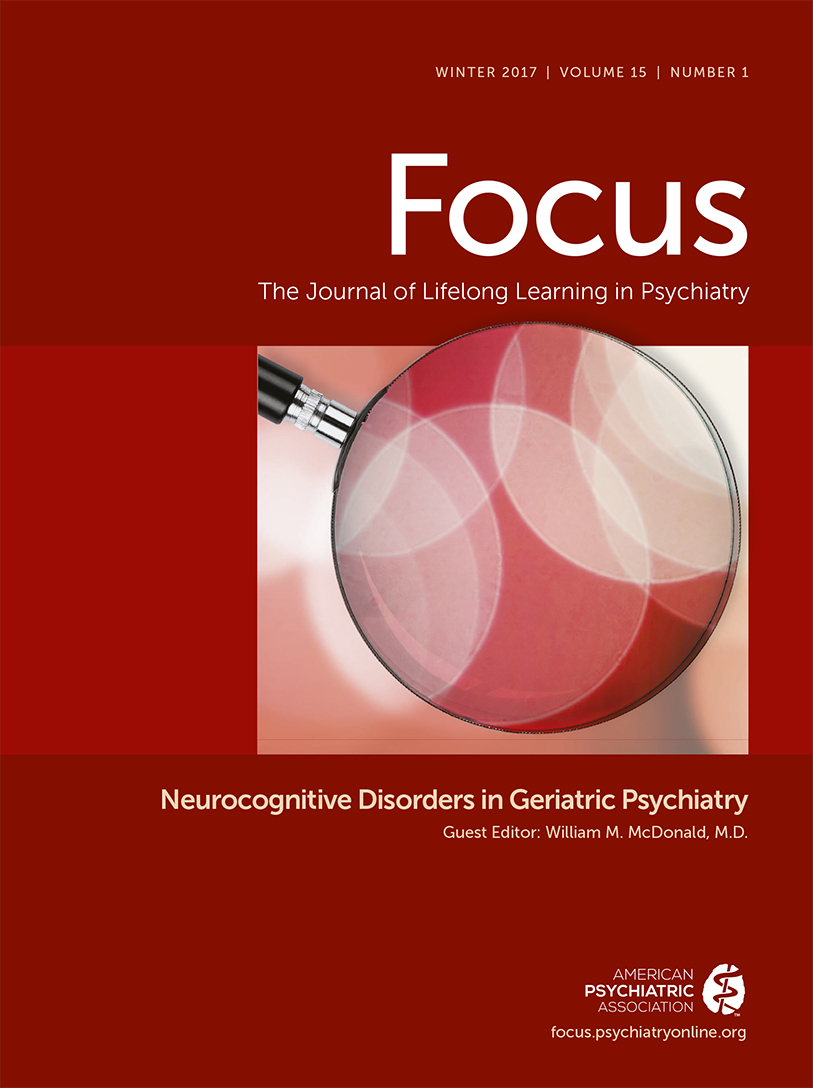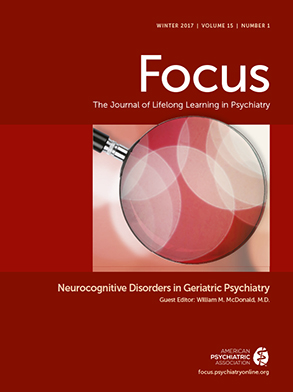This issue of Focus centers on neurocognitive disorders (NCDs), with an emphasis on disorders that are encountered in the practice of geriatric psychiatry. The number of patients with dementia is doubling every 20 years, and estimates indicate that more than 115 million people worldwide will have dementia by the year 2050. NCDs are a key determinant of elders' quality of life, and cognitive decline is an important factor in an individual’s ability to live independently. Several psychiatric disorders, including late-life depression and psychosis, have comorbid cognitive symptoms, and recognizing and managing these symptoms are important in the care of the patient. In this issue, experts in the field review the data on the epidemiology, diagnosis, and treatment of NCDs and describe the overlap of NCDs with psychiatric syndromes.
The first review article (
1) provides an overview of NCDs that outlines the definitions that were introduced in the fifth edition of the
Diagnostic and Statistical Manual (
DSM-5).
DSM-5 has three categories for NCDs: delirium, mild NCD, and major NCD. Some of the key changes from
DSM-IV to
DSM-5 are the inclusion of NCDs that occur with younger patients (traumatic brain injury, for example) and the distinction between mild and major NCD. The diagnostic categories within mild NCD and major NCD (which includes Alzheimer’s disease [AD]) are discussed, and an overview is provided of the overlap of NCD and psychiatric disorders. Finally, the review outlines research on identifying biomarkers to determine which elders are at risk for developing NCD as well as which patients with mild NCD may progress to major NCD.
The review by Uflacker and Doraiswamy is an overview of AD with a review of recent developments in the assessment and treatment of this most common major NCD (
2). They outline the criteria for the diagnosis of AD, which may involve using biomarkers to detect latent AD in the preclinical stages by using cerebral spinal fluid markers, as well as use of MRI volumetric techniques to measure atrophy, 18F-fluorodeoxyglucose tracer, and amyloid positron emission tomography. Uflacker and Doraiswamy also review new treatment options for AD, including therapies that prevent amyloid plaque formation or increase amyloid clearance. In addition, they review the evidence for the efficacy of immunotherapy agents, γ-secretase inhibitors of Aβ synthesis, and β-secretase inhibitors targeting amyloid precursor protein (APP) cleavage. Finally, they present strategies to address lifestyle modification, including exercise and nutritional interventions.
The review by Legesse and colleagues on the management of neuropsychiatric symptoms in NCDs summarizes the recent data on evaluation and treatment of neuropsychiatric symptoms (NPS) in major NCDs (
3). NPS occur for 90% of patients with major NCDs, and NPS can include symptoms of apathy, agitation, psychosis, depression, and anxiety. These symptoms can be the most distressing aspect of the illness to patients and their caregivers. Legesse et al. describe the epidemiology and pathogenesis of NPS and provide an update on the nonpsychopharmacologic and pharmacologic treatments of behavioral symptoms in NCDs.
The overlap of psychiatric symptoms and NCDs is an area of intense interest to clinicians working with patients with psychotic disorders, late-life depression, and neurological disorders. Murante and Cohen provide an overview of the cognitive impairment that is an important clinical feature of patients with schizophrenia in late life (
4). More than 70% of patients with schizophrenia have significant cognitive deficits, and Murante and Cohen describe the scope of the deficits, the effect of the deficits on the long-term outcomes, and the evidence for pharmacologic treatment of the cognitive deficits. Aziz and Steffens (
5) evaluate the link between late-life depression and cognitive impairment. They examine the neurobiological mechanisms that link depression and cognitive impairment and conclude that depression is both a risk factor and a prodromal symptom of dementia. Aziz and Steffens outline a number of mechanisms for this association, including hippocampal atrophy, alterations in glucocorticoid secretion, cerebrovascular compromise, deposition of β-amyloid plaques, chronic inflammation, and deficits of nerve growth factors.
In the final review article, Mack and Marsh (
6) examine the overlap of cognitive disorders and Parkinson’s disease (PD). They describe the impact of NCDs in PD, the effects of NCDs on quality of life, and the importance of recognizing cognitive disorders in the care of patients with PD.
Future research should focus on early diagnosis, including developing biomarkers that may aid in identifying persons at risk of developing NCDs. The hope is that early interventions can lead to more effective treatments and long-term outcomes for these patients. Many thanks to my fellow contributors for this issue of Focus. We hope that this issue will provide insight into the clinical management of cognitive dysfunction for these patients and some directions for future research in this important area.

